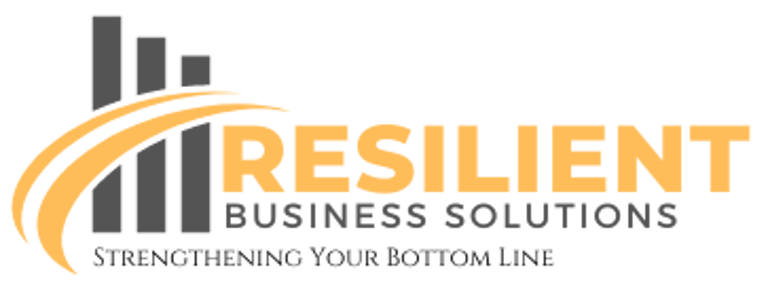5 Payroll Compliance Mistakes to Avoid and How Resilient Business Solutions Can Help
Dive into the essentials of payroll compliance and why it’s critical for your business. This post explores the complexities of adhering to federal, state, and local regulations while highlighting common payroll mistakes and how to avoid them. Learn actionable strategies, including automation, employee training, and expert consulting, to ensure compliance and protect your business from costly fines and legal risks. Discover how Resilient Business Solutions can provide the tools and expertise to streamline your payroll processes and foster a compliant, efficient workplace.
5 min read


Introduction to Payroll Compliance
Payroll compliance is an essential aspect of business operations that involves adhering to a multitude of federal, state, and local regulations governing employee compensation. This compliance ensures that a business meets all legal obligations related to payroll, including tax laws, labor laws, and wage regulations. For organizations, it is crucial to understand that payroll compliance is not merely a routine administration task; it is a cornerstone of corporate responsibility and operational integrity.
Tax laws dictate how much tax must be withheld from employee wages, while labor laws outline the rights of employees regarding minimum wage, overtime, and benefits. Additionally, wage regulations encompass a range of requirements including ensuring fair compensation practices and maintaining accurate records. The complexity of these regulations can vary significantly from one jurisdiction to another, requiring businesses to be vigilant in their efforts to stay updated and compliant.
The repercussions of failing to maintain payroll compliance can be severe. Businesses may face hefty penalties, including fines and back taxes, which can lead to significant financial strain. Furthermore, legal challenges arising from non-compliance can damage a company's reputation and erode employee trust. The potential for costly litigation adds another layer of risk for businesses that overlook these obligations. Therefore, it is imperative for organizations to establish effective payroll processes that are both robust and adaptable to the ever-changing regulatory landscape.
In this context, working with proficient payroll service providers can enhance a business's ability to remain compliant. These solutions often offer expertise and resources to navigate the complexities of payroll regulations, helping to mitigate risks associated with non-compliance. By prioritizing payroll compliance, businesses not only protect themselves from legal issues but also foster a fair and transparent work environment that benefits both employers and employees.
Common Payroll Compliance Mistakes
In the complex landscape of payroll management, businesses often encounter several compliance mistakes that can lead to significant legal and financial repercussions. One of the most prevalent errors is misclassifying employees. This mistake occurs when a business incorrectly categorizes a worker as an independent contractor rather than an employee, or vice versa. Misclassification can result in unpaid taxes, penalties, and even legal actions from misclassified workers seeking rightful benefits.
Another common oversight is the failure to keep accurate and detailed payroll records. Businesses are required to maintain comprehensive records that document every aspect of employee compensation, including hours worked, wages paid, and any deductions made. Inadequate record-keeping can lead to disputes, miscalculations in payroll taxes, and regulatory investigations. Not only does this mistake disrupt payroll processes, but it may also culminate in severe fines from regulatory bodies.
Adhering to overtime regulations is also critical. Businesses often neglect to monitor hours worked closely, which can result in failing to compensate non-exempt employees properly for overtime hours. This non-compliance can trigger back pay claims and penalties from labor agencies, impacting both financial viability and reputation.
Overlooking local tax laws constitutes yet another significant error. Payroll tax laws can vary greatly by jurisdiction, and businesses must ensure compliance with both state and local tax regulations to avoid penalties and heightened scrutiny from tax authorities. Failure to comply can lead to back taxes, fines, and an increased risk of an audit.
Lastly, improper handling of employee benefits, including health insurance contributions, retirement plans, and other benefits can pose compliance risks. Mismanagement in this area can lead to employee dissatisfaction and legal challenges surrounding wrongful denial of benefits. Being aware of these common payroll compliance mistakes can help businesses navigate payroll complexities and uphold regulatory standards effectively.
How to Avoid Payroll Compliance Issues
Ensuring payroll compliance is crucial for any business looking to avoid legal repercussions and maintain a smooth operational flow. One of the most effective strategies is to conduct regular audits of payroll processes and records. These audits can help identify discrepancies and ensure that information such as employee classification, hours worked, and compensation aligns with the relevant laws and regulations. Regular audits promote accountability and transparency within the organization, making it easier to spot potential compliance issues before they escalate.
Implementing automated payroll systems can also greatly enhance both efficiency and accuracy. Automated payroll software minimizes the risk of human error, streamlining calculations for wages, deductions, and benefits. Furthermore, these systems often include features that automatically update to reflect changing regulations and tax rates, ensuring that businesses remain compliant with current payroll laws. Consequently, adopting technology in payroll processing is not just a matter of convenience but a practical solution for minimizing compliance challenges.
Proper employee training plays a pivotal role in maintaining payroll compliance. It is essential to educate staff about employment laws, proper payroll documentation procedures, and the implications of misclassification. Regular training sessions can help employees understand their responsibilities, thus preventing mistakes associated with payroll. Additionally, organizations should encourage open communication within teams to discuss compliance-related queries or uncertainties.
Staying updated on changing regulations is another critical aspect of avoiding payroll compliance issues. Businesses must monitor relevant legislation, whether it involves federal, state, or local laws. This is where consulting with payroll experts and HR professionals becomes invaluable. These specialists provide insights into best practices, facilitate compliance with new regulations, and offer tailored solutions for specific business needs. By leveraging expert advice, companies can establish a resilient payroll process that adapts to regulatory changes seamlessly.
The Role of Resilient Business Solutions
In the ever-evolving landscape of payroll compliance, the integration of resilient business solutions plays a pivotal role in mitigating risks and ensuring adherence to regulations. These specialized services offer tailored consulting that caters to a company's unique compliance needs, enabling businesses to identify vulnerabilities in their payroll processes. By leveraging expert advice, organizations can develop streamlined strategies that align with regulatory changes, effectively reducing the likelihood of costly penalties or audits.
One of the fundamental services offered by Resilient Business Solutions is the implementation of robust payroll software. This technology facilitates accurate calculations and timely submissions of payroll taxes, ensuring that businesses remain compliant with federal, state, and local regulations. The software typically includes features such as automated compliance alerts, real-time reporting, and customizable dashboards that empower HR and payroll professionals to monitor compliance effectively. This integrated approach not only enhances accuracy but also saves valuable time and resources.
Furthermore, ongoing support is a critical component of resilient business solutions. As regulations frequently change, businesses require continuous guidance to navigate the complexities of compliance. Providers of resilient business solutions often offer post-implementation support, ensuring that companies stay updated on new legislation and industry best practices. This level of support helps businesses maintain compliance year-round, ultimately leading to increased operational efficiency.
Numerous case studies illustrate the substantial return on investment that can be achieved through these solutions. For example, a mid-sized manufacturing firm that adopted a robust payroll service saw a 30% reduction in compliance-related errors within just six months. By investing in expert help for payroll processes, organizations not only safeguard against fines but also foster an environment where compliance is ingrained in the company culture, driving overall business resilience.
When You Are Ready
Ready to simplify your business operations? At Resilient Business Solutions, we’re here to take the stress out of so many of your business tasks, so you can focus on what you do best — growing your business. Whether you need help with bookkeeping, invoicing, managing payables and receivables, content creation, or a new website design, we’ve got you covered. Contact us today to learn how we can support your business with reliable, expert services. Let’s build a resilient future together!
Strengthening Your Bottom Line
Customized financial support to empower your business success.
Get Our Free 50+ Page Small Business Success Guide Now
© 2024. All rights reserved.
